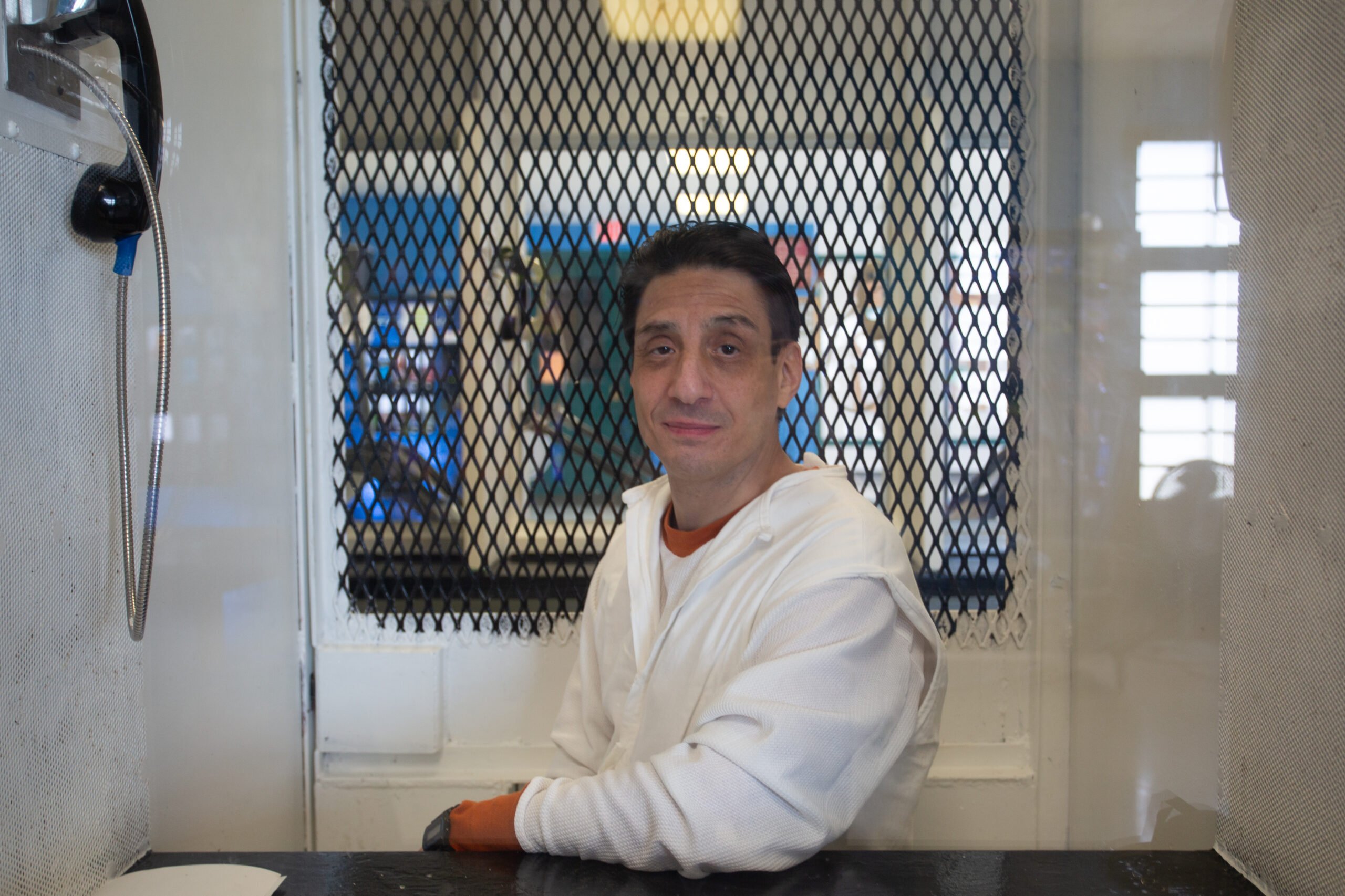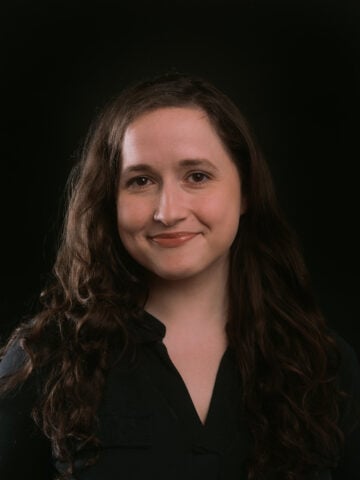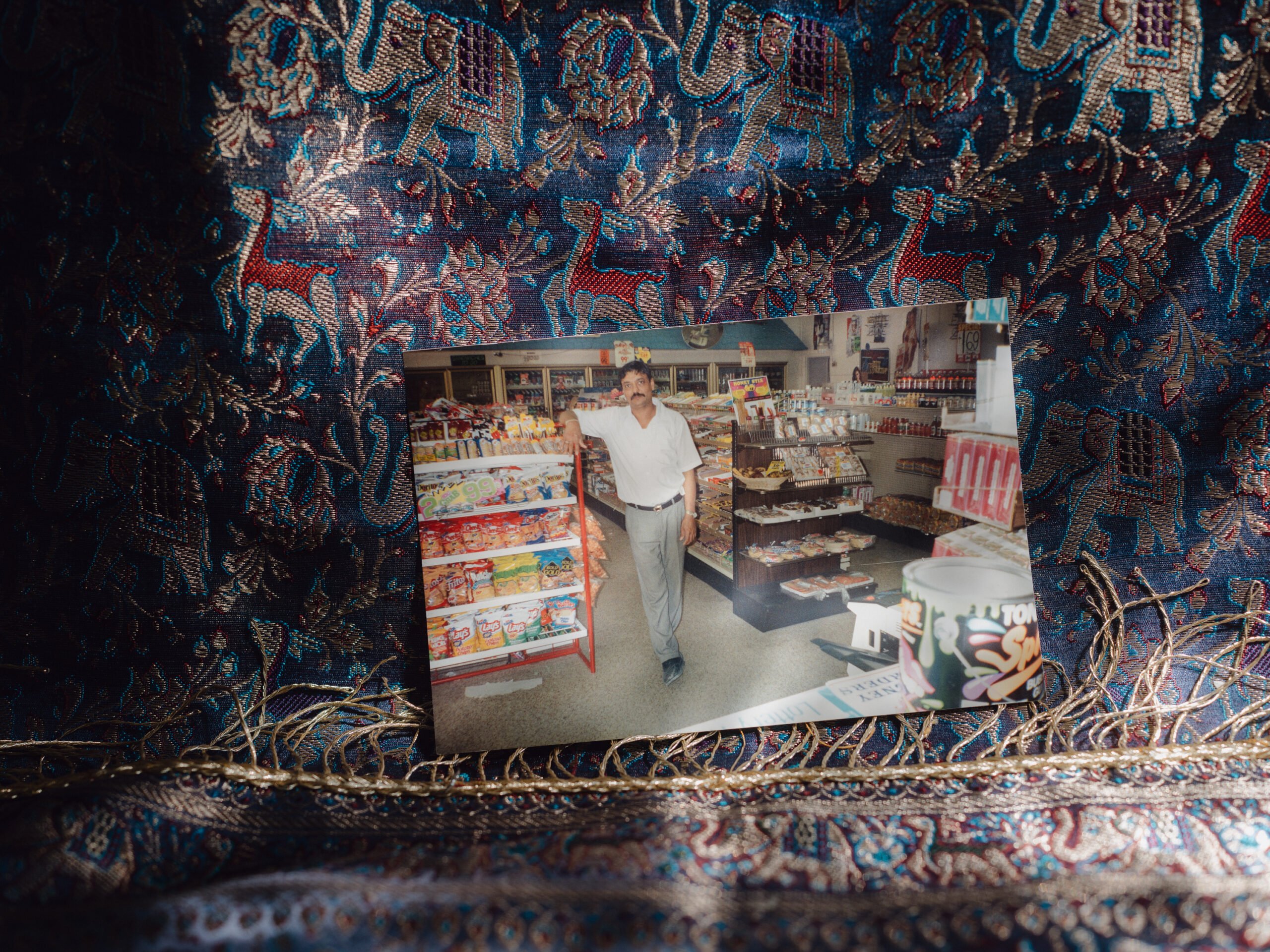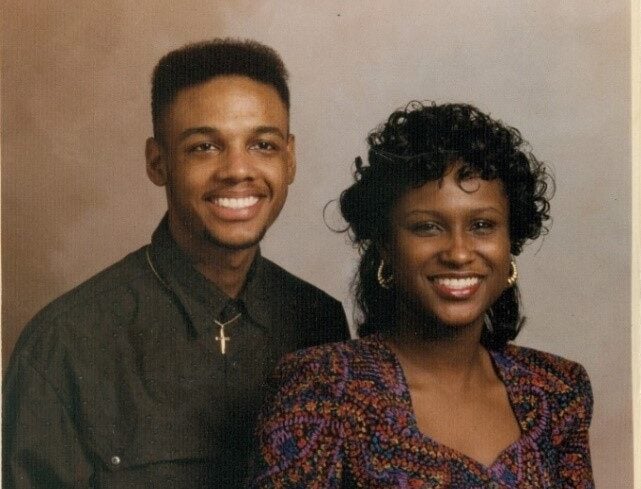Update: On February 28, Ivan Cantu was executed by lethal injection in Huntsville. Leading up to his execution, a growing number of advocates pleaded with Governor Greg Abbott to halt the execution. The original foreperson of the jury spoke out saying he no longer believed in the conviction and that he felt fooled by the trial.
Ivan Cantu sits in a small cubicle in the visitors’ area at the Polunsky Unit, penned in by a metal grate at his back and a thick pane of glass in front. Over a closed-circuit phone, he talks quickly about the murder case that put him in prison. He can recall decades-old details with clarity and track complicated timelines in his head. For the past 22 years, he’s been going over the details of his case with family, lawyers, and investigators—all in an effort to prove his innocence.
Cantu was sentenced to death in October 2001 after being convicted of murdering his cousin, James Mosqueda, and Mosqueda’s fiancee, Amy Kitchen. Both were found fatally shot in the bedroom of their home in North Dallas on November 4, 2000. When the bodies were discovered, Cantu was hundreds of miles away, having left that morning for a trip to meet his own fiancee’s parents in Arkansas. He was arrested days later when he returned to Dallas.
The state’s case against Cantu, the jury decided, was airtight. Mosqueda’s Corvette was found parked outside of Cantu and his fiancee Amy Boettcher’s apartment, just over a mile away from the crime scene. A pair of jeans and socks with droplets of the victims’ blood were discovered in the apartment’s kitchen trash can. And Amy Boettcher herself later told police that Cantu had committed the murders—that he had even taken her to the scene and shown her the bodies.
At trial, Cantu’s original defense attorneys didn’t call any witnesses. After the state rested its case, the defense did too. During closing arguments, Cantu’s lawyer conceded his client’s guilt against Cantu’s wishes, saying, “I didn’t say he was innocent. I said he’s not guilty of capital murder.” At one point, Cantu stopped the trial to ask the judge if he could represent himself, the transcript shows. His request was denied.
“With a real attorney, a real investigation team, we’ve been able to discredit the case.”
“[I thought], hey, at least let me give it a shot … to get to the truth,” Cantu told the Texas Observer this month. “Not just to get an acquittal, but to get the information for James [Mosqueda] and Amy [Kitchen]. That’s the point of the trial: to get to the truth.”
Decades later, Cantu is still trying to make his own case, and he’s not alone. In the years since his conviction, Cantu’s lawyer, private investigators, and a dogged independent podcast host have helped uncover new evidence that seems to discredit the state’s star witness—Cantu’s ex-fiancee—and casts doubt on Cantu’s guilt.
“Today, it’s a completely different time because, with a real attorney, a real investigation team, we’ve been able to discredit the case,” Cantu said.
But as of now, Texas courts are refusing to consider the new evidence. Cantu is set to be executed February 28.
Cantu looks young in his booking photo; he was just 28 when he was convicted of capital murder. Now, he looks every bit of his 50 years, but in many ways, he’s still reliving one week in 2000.
On November 4, 2000, police found the bodies of James Mosqueda, 27, and Amy Kitchen, 22. Both had been shot multiple times, but police found no gun at the scene. Mosqueda was a known drug dealer “who sold in large quantities,” according to court documents. Kitchen was a nursing student. The two had gotten engaged only a few months prior.
Police noted several missing items that appeared to have been stolen, including Mosqueda’s Rolex watch and Kitchen’s diamond engagement ring.
Soon after the discovery, Mosqueda’s aunt Sylvia Cantu—Ivan’s mother—requested a welfare check on her son. She and officers searched Ivan’s apartment at 8:25 p.m. They found no bodies—Cantu and his fiancee were both in Arkansas—and neither the officers nor Sylvia noticed anything amiss, aside from a small bullet hole near the door. But hours later, police located Mosqueda’s Corvette in the parking lot of Ivan’s apartment complex.
Another search on November 7 turned up bloody clothing in the trash can, as well as a box of bullets and Amy Kitchen’s car keys.
Cantu was still in Arkansas, fielding calls from friends and relatives about the murders. He told more than one caller a frightening story, one that he believed shed light on the potential motive for the murders.
On November 2, two days before the murders, Cantu said a man dressed as a pizza delivery person had shown up to his apartment to intimidate him, claiming Mosqueda owed him a huge sum of money. The man then fired a warning shot into the wall. This not only offered a motive for someone else to have killed Mosqueda but also explained the bullet left in the wall of Cantu and Bottcher’s apartment. (Amy Boettcher offered a different version, later saying that Cantu fired a gun at her during an argument and that’s where the bullet in the wall came from.)
Cantu and Boettcher left Arkansas November 7 to return to Dallas. By then, Cantu had spoken with Dallas detectives by phone and was planning to meet with them the following day. In the meantime, he and Boettcher went to Cantu’s ex-girlfriend Tawny Svihovec’s apartment to stay the night. On the morning of November 8, Cantu and Svihovec left the apartment, with Boettcher staying behind. Just before noon, Cantu called his fiancee and told her he’d been arrested.
Boettcher flew back to Arkansas that same day. There, she told her parents that Cantu had committed the murders, and with the help of her stepfather, a former law enforcement officer, she made several statements to police.
But Cantu says Boettcher lied.
In 2020, private investigator Matt Duff launched the first episode of his podcast, “Cousins By Blood.” The episode lays out the state’s case against Cantu. It’s presented all at once, and the evidence summed up is damning. After Cantu’s arrest, Svihovec called Dallas police, saying she had found the murder weapon stashed beneath her couch cushions. Cantu’s thumbprint was found on the magazine, though not the gun itself.
Then Duff’s narration, delivered with a deep timbre and slightly Southern lilt, takes the listener by surprise: “There is a strong possibility that Ivan was set up.”
Both Cantu and Svihovec say they believe Boettcher planted the gun beneath the couch cushions during the hours she was alone in the apartment.
Boettcher and Cantu had only met a few months before the murders. A heavy drug user, she had moved to Dallas on a whim with men she met at a bar in Minnesota, according to Duff’s investigation.
Over the course of his more than 40-episode podcast, Duff has uncovered much more evidence that was never examined in 2000.
Duff speaks with Sylvia and Ivan Cantu, witnesses who saw Cantu and Boettcher the night of the murders, longtime friends of the victims and Cantu, and alternative suspects. Duff even travels to Minnesota to track down Boettcher to see if she stands by her story. He enlisted the help of independent ballistics experts, forensic pathologists, and fingerprint experts. He collaborated with an officer who conducted the initial wellness check at Cantu’s apartment after the officer told him she didn’t believe the evidence was there when she did the sweep.
Duff often calls for crowd-sourced information on his podcast, and listeners deliver. Key witnesses have reached out to him.
But he’s careful on the podcast to consider all possibilities, including that Cantu did commit the murders. “If you look at the totality of evidence and everything that was so wrong about the case, I just want the audience to decide what they think about guilt or innocence,” Duff told the Observer. “But what we can prove is that Ivan didn’t get a fair trial.”
Duff works independently, funding his investigation himself. But when he comes across new evidence, he shares it with Cantu’s lawyer, Gena Bunn.
Bunn, who has represented Cantu for the past 15 years, has been trying to get the courts to consider this new evidence. Now in private practice, Bunn used to represent the State of Texas in the death penalty appeals process. Cantu’s case was the first time she took the defense’s side.
“The failure to call witnesses and generally to launch any concerted effort to investigate his actual innocence was incredibly negligent.”
In an appeal Bunn filed with the Texas Court of Criminal Appeals last year, she lays out several new discoveries to support a claim that the state’s star witness, Boettcher, and her brother Jeff Boettcher gave false testimony and that Cantu’s conviction should be overturned.
Boettcher testified that Cantu had called his cousin around 11:30 p.m. on the night of November 3, saying he wanted to visit. Boettcher then testified that Cantu went to his cousin’s house and returned home after midnight, covered in blood.
But Bunn argues that independent forensic pathologists have found that it’s more likely the couple was killed between 6:30 a.m. and 10:30 a.m. on the morning of November 4, meaning Boettcher’s narrative falls apart right at the beginning.
Boettcher also testified that Cantu stole his cousin’s Rolex on the night of the murders and that she later watched him toss it out of the car window. But the watch was never actually stolen. Cantu’s father confirmed that the Rolex had been found in the victims’ home and returned to the family shortly after the murders. So the state’s star witness lied about the watch in her testimony, Bunn argues.
One particularly morbid detail from the state’s case against Cantu was that he, per Boettcher, had proposed to her using the victim’s stolen engagement ring on the night of the murders. But the ring was never recovered and never entered into evidence. Other witnesses have since come forward to say the couple was engaged at least a week before the murders and that Boettcher was wearing a different ring.
Finally, Cantu’s former fiancee testified that when he returned to the apartment after committing the murders, he put his bloody jeans and socks in their kitchen trash can. But the officer who conducted the wellness check on Cantu’s apartment on November 4 has “since stated that the jeans—which were at least two sizes too large for Mr. Cantu—and socks were not in that trash can at the time, indicating that someone else had placed the items in the trashcan after Mr. Cantu left for Arkansas,” the appeal says.
Boettcher’s brother, Jeff Boettcher, separately testified that Cantu had told him he planned to kill his cousin. But in 2022, Jeff Boettcher “disavowed his trial testimony, insisting that he ‘lied’ and was not a credible witness due to his history of drug abuse,” court filings show.
All this evidence—the statements from the experts about the time of death, the location of the not-stolen Rolex, other witnesses who came forward, and the recantation of Jeff Boettcher’s testimony—cropped up long after Cantu’s trial. But so far, Texas courts have refused to consider any of it.
Many of the current roadblocks are due to mistakes Cantu’s previous lawyers made during trial and his initial appeals. Burke Butler, executive director of the Texas Defender Service, which is not involved in Cantu’s case, said Cantu’s trial lawyers did not properly defend their client.
“The failure to call witnesses and generally to launch any concerted effort to investigate his actual innocence was incredibly negligent,” Butler told the Observer. “These are really grave and serious failures.”
Cantu’s original trial lawyers did not respond to emailed requests for comment.
Cantu’s conviction and sentence were affirmed on direct appeal, which is automatic for capital cases in Texas. Subsequent appeals were unsuccessful at the state and federal level.
Then, in 2009, Bunn filed a motion for post-conviction DNA testing based on the evidence found in the trash can—the jeans and socks. In Texas, it can be hard to win the right for post-conviction testing of evidence, but both sides agreed to the testing. Those tests did not find conclusive evidence of Cantu’s DNA on the jeans.
Finally, in 2020, a Collin County district court judge held follow-up evidentiary hearings on the DNA and determined that, even though the DNA did not show that Cantu was wearing the jeans, “the new DNA evidence would not have made a difference at [Cantu’s] trial,” court records show. The judge felt the rest of the evidence, including Boettcher’s testimony, was sufficient.
Butler finds that ruling unfair. “If we had a just system, number one, [the newly discovered] evidence would have been presented to the jury in the first place,” Butler said. “And number two, it would be easier for him to get this evidence reviewed on the merits before a court. … Unfortunately, [the] system of justice is really stacked against people who are actually innocent.”
Ivan Cantu has been given two prior execution dates, but both have been halted.
In 2022, after the DNA hearing concluded, Cantu received an execution date for April 2023. But Collin County District Judge Benjamin Smith withdrew that death warrant after Bunn filed her appeal outlining the new evidence.
Then, on August 23, a judge dismissed the new evidence for procedural reasons without considering the merit of her arguments.
This month, Bunn filed a new request with the court to reexamine the ballistic evidence in the case since Duff and other investigators have conducted their own ballistics experiments that cast more doubt on some of the police’s original conclusions.
To this day, Bunn doesn’t know if she has received everything related to Cantu’s case from the Collin County District Attorney’s Office and from the Dallas Police Department. Part of the issue is that 20 years have passed since the original trial, and many people currently working in those departments weren’t around then. Another issue was jurisdiction—Dallas police, then and now, don’t usually work with Collin County prosecutors—but the murders happened in a portion of North Dallas that extends into Collin County.
Winning post-conviction relief is extremely difficult in Texas, though not impossible: 464 people have been exonerated of various crimes here since 1989, according to the National Registry of Exonerations. About a third of those cases were overturned due to perjury or false accusations, according to the registry. Nearly one in five was due to inadequate legal defense.
Almost 70 exonerations were from Dallas County. But Cantu’s case was tried in Collin County, even though it was investigated by the Dallas Police Department. Since 1989, only four people sent to prison from Collin County have been exonerated.
The judge who presided over Cantu’s trial, Charles Sandoval, has since been heralded “the worst judge in Collin County”. Known as “Hang Them All Sandoval,” he lost his seat in 2008 after developing a reputation for cruelty and for making decisions based not on law but on courtroom favorites. One of the four recent Collin County exonerations was of former Judge Suzanne Wooten, who was convicted of bribery after successfully challenging Sandoval in a judicial campaign. That accusation came directly from Sandoval, but the charges were later overturned and discredited as a baseless vendetta.
On Valentine’s Day, Cantu will submit his paperwork to tell the prison system who he wants there on his execution day and what he wants the state to do with his body afterward. He’ll explain where he wants his few belongings and any money left in his account to go.
Sister Helen Prejean, author of the book Dead Man Walking, is acting as Cantu’s spiritual adviser. She’ll be there with Cantu during his execution if his date holds. But in the meantime, she is a fierce advocate for the date to be withdrawn.
“There’s no way I’m simply going to acquiesce, hold his hand, and pray him into eternity without doing every single thing I can to get the truth out so that Texas does not execute this man who very possibly might be innocent,” Prejean told the Observer.
Prejean, along with Cantu’s other supporters, are calling on Collin County to again withdraw his death warrant. It’s one of many ongoing efforts to spare Cantu’s life—and to give him another day in court. Officials from the county did not respond to requests for comment for this story.
“If you want to execute me, that’s fine,” Cantu said over the closed-circuit phone in the Polunsky Unit. “Just give me a fair trial.”




